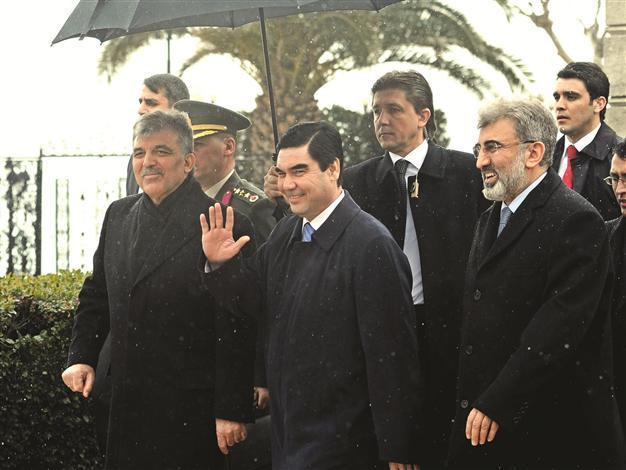Turkish firms called to ‘rebuild’ Turkmenistan
ISTANBUL

Turkish President Gül (L), his Turkmen counterpart and Minister Taner Yıldız (R). AA photo
Authorities in Ashgabat will resolve the payment difficulties of Turkish businessmen in Turkmenistan, the Central Asian country’s president said yesterday while offering attractive business deals for Turkish businessmen who want to invest in Turkmenistan.“Anything can happen in our lives, and we are ready to solve it all,” Turkmen President Gurbanguly Berdimuhamedov said, addressing the difficulties some Turkish firms have had receiving payment for completed projects in Turkmen cities. Visiting for the first time since his re-election, Berdimuhamedov spoke at the Turkmen-Turkish Business Forum in Istanbul, which was organized by the Foreign Economic Relations Board of Turkey (DEİK).
“We have intense relations with Turkmenistan, it is inevitable we encounter some problems,” Turkish President Abdullah Gül said, adding that both leaders had exchanged ideas to resolve the ongoing disputes. “The Turkmen leader has given instructions to officials regarding the issue.”
“Turkmen authorities made such promises before, but they never came true,” Tarık Bozbey, head of the Mediterranean Exporters Union, told the Hürriyet Daily News on the sidelines of the meeting.
Nearly 40 Turkish firms have been waiting for Turkmen authorities to pay nearly $1.3 billion for completed construction projects, said Bozbey, who represents Turkish firms that have encountered payment difficulties in Turkmenistan.
Opportunities for partnerships
“There are great projects that we invite you to take part in ... There are new plants and facilities to construct and cities to build in Turkmenistan,” said Berdimuhamedov, noting Turkish firms would have priority in taking part in the giant projects.
Turkmenistan trades with more than 100 countries, the Turkmen president said, calling Turkey a strategic partner. He said Turkmenistan had agreed to 1,299 construction projects to be run by Turkish companies in 2010 and that Turkish firms had been active in Turkmenistan since its independence 20 years ago.
Berdimuhamedov said a recently explored natural gas field with a capacity of 26.2 trillion cubic meters in the southern part of the country presented opportunities for partnerships with Turkish firms.
“Turkey is also invited to take part in our gas pipeline projects with Pakistan and Afghanistan,” said the Turkmen leader. Ankara-based Lotus Energy has currently constructed two grids with a 254-megawatt capacity each to transfer electricity to Afghanistan, he said, adding that Turkish firms had been invited to participate in the expansion and connection of Turkmen ports with railroads, as well as energy projects.
“The world closely watches Turkmenistan as it plays an important role in the world’s energy market,” said Gül, noting that Turkey and Turkmenistan could enhance bilateral business bonds.
Turkish Economy Minister Zafer Cağlayan said Turkey and Turkmenistan should develop extensive cooperation not only in construction, but also energy, education, tourism, technology and agriculture. According to official data, Turkey’s bilateral trade volume rose to $3.65 billion by the end of last year and had gone up 2.8 fold since 2007.
















